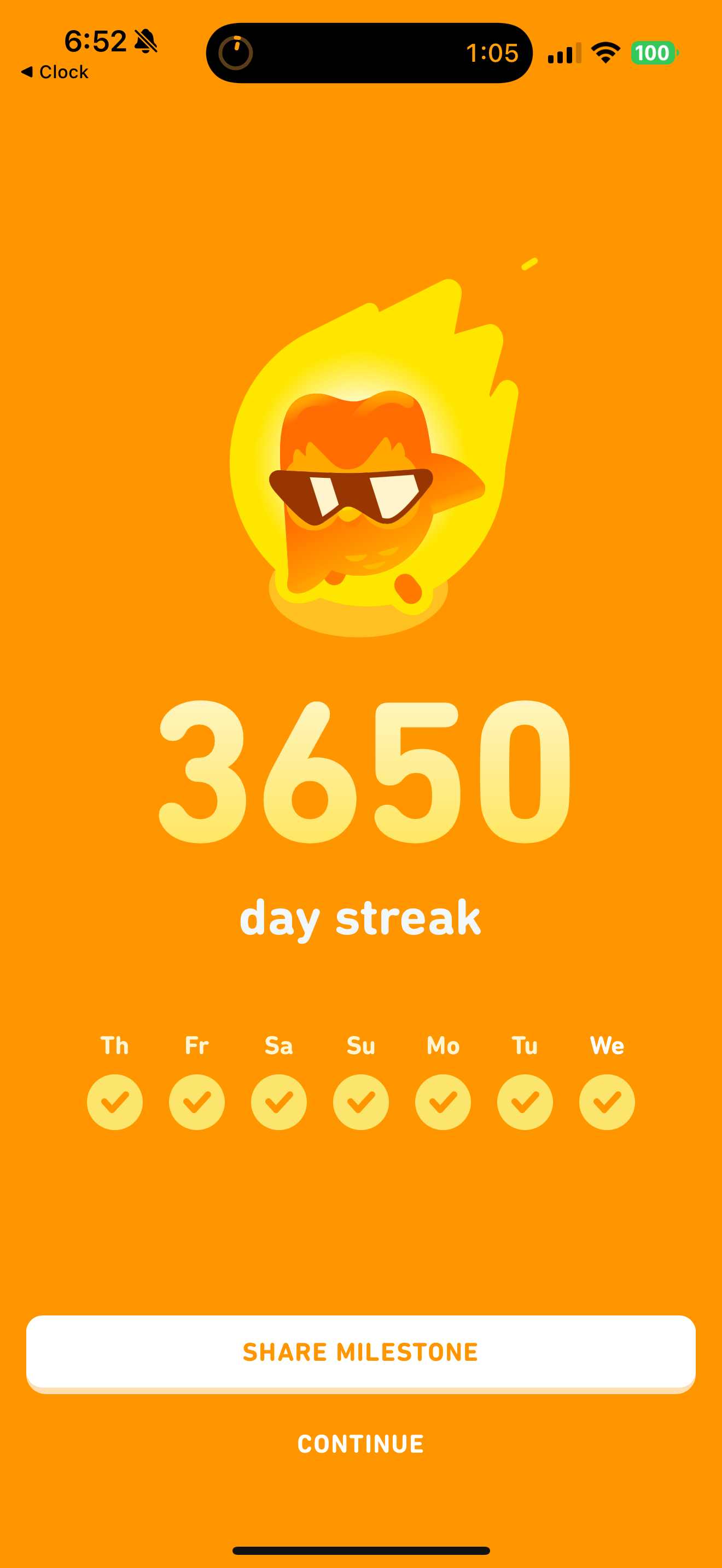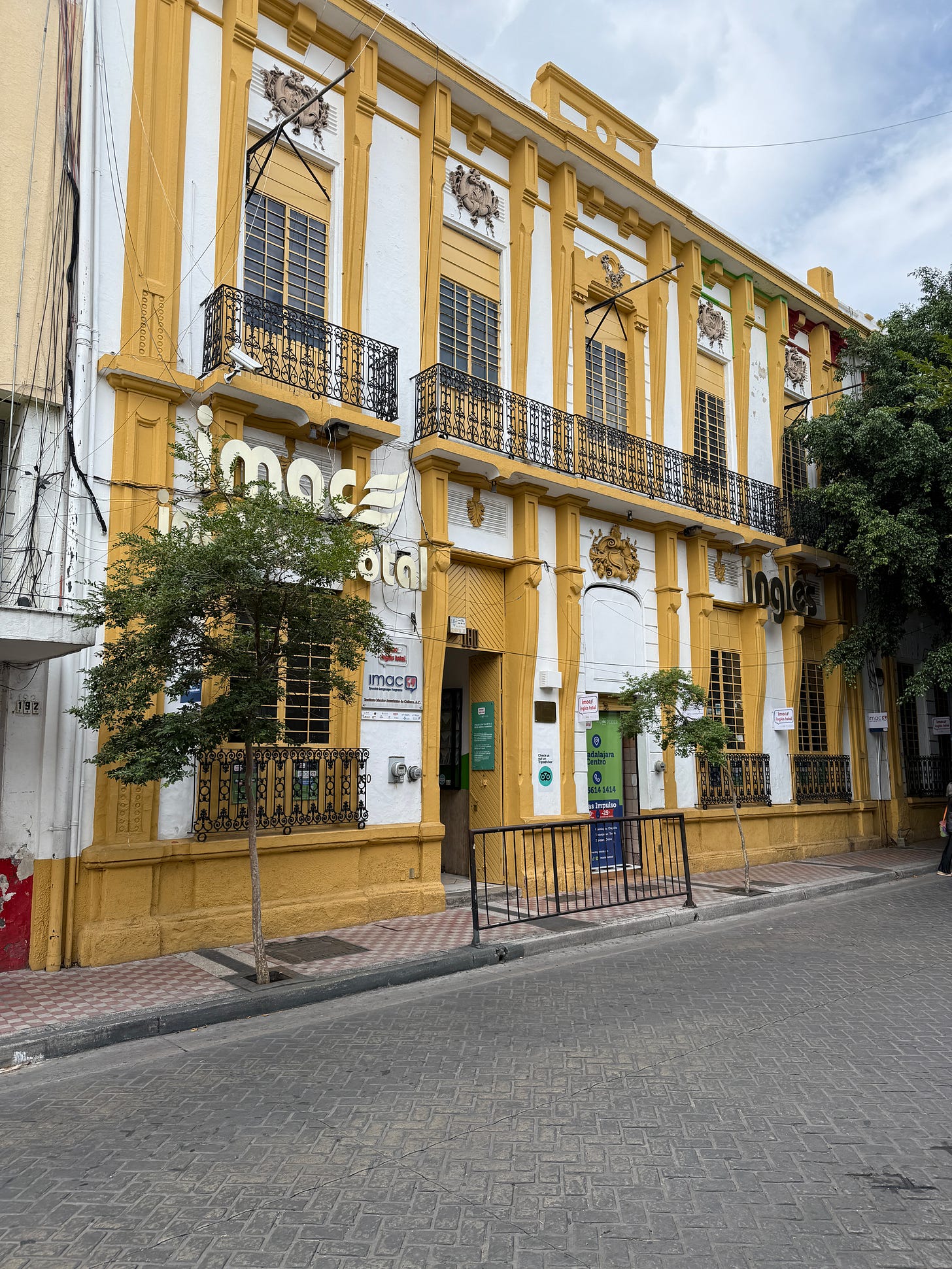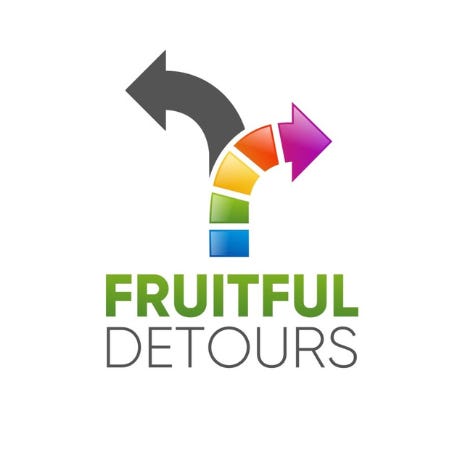Ten Years on Duolingo
But can I speak Spanish?
I’ve got a streak of more than ten years going on Duolingo. I’ve used the app 3,662 days in a row as of the time of this post. It’s the first thing I do every morning. I’ve only been scared of losing it once, when I was on a cruise ship, and I didn’t know if I could get a signal. But the ship’s internet package worked just fine.
Duolingo has changed a lot over the years, and it keeps changing. I’ve been close to completing the entire learning path a couple of times, and then they added a bunch of additional sections. They’ve also added many new features, like interactive AI for conversations, and it’s really impressive. Now I hope that they keep making improvements and adding new lessons. The game part of Duolingo has served its purpose. It has kept me engaged and learning. The most important thing for me now is to continue adding to my knowledge of Spanish.
Can I learn a language with just an app?
Some people ask, can I learn a language just by using an app? My answer is, I don’t know. Here’s the thing: I gave up on using Duolingo alone a long time ago. You might even say I’ve never used it by itself, because I had Spanish classes in high school, long before Duo existed. But once it really became a goal to become more comfortable in the language, I used all kinds of resources, and I’ll review some of them below. I’ve taken months of Spanish classes live in Mexico and Guatemala, I’ve bought a bunch of books, and I have a whole collection of apps. I’ve listened to podcasts and read newspapers and magazines. I watch TV shows in Spanish. And right now I’m serving as a missionary at a nonprofit in Mexico.
So can I speak Spanish? Yes. I can live in Mexico and do everything that I want to do. I can order food, talk baseball to cab drivers, and kid with people that I’m working with. I can watch movies and understand what’s happening. But I’m doing everything with the vocabulary of a fifth grader. At least, that’s where I would place myself. There is an actual placement system that most language schools use called the Common European Framework of Reference for Languages (CEFR), and the last time I took it I was considered at an Advanced Intermediate level.
It’s interesting. As an adult with some experience, but only a limited vocabulary, I can still do some pretty cool stuff. On this trip I’ve taught a high school class on abnormal psychology, led a social-emotional learning group for children, interviewed two job candidates, and understood just about every word of one bishop’s sermon. All this while still wishing the whole time that my words would come more quickly and easily.
So can I speak Spanish? Yes, but I’m still not at the level I desire. I’m realizing I may never get there. I’ll keep working at it, and let you know how it goes.
For those of you who are interested, here are my reviews of various resources (TL;DR - I recommend all of them. There’s a lot of junk out there, but these have all been worth the money to me.)
Duolingo - You all know that I like this app. It is really great for beginners, and it becomes progressively more challenging as you learn more.
Rocket Languages - This is a comprehensive language learning program that has a different approach than Duolingo, but includes longer stories that are really engaging.
SpanishDictionary - There are lots of translation apps available, but this is one of the best. I like the vocabulary feature.
DeepL - This is another great translation app that I find helpful for longer passages.
Qroo Paul’s Spanish classes - I found Qroo Paul on YouTube, and he explains Spanish grammar in a relatable way. I have joined his paid Spanish group, which provides many more resources.
Ella verbs - One of the most difficult things to master in Spanish is the structure of verbs. There are 18 tenses, and 3 moods to learn. This app focuses on verbs, and has tons of drills.
Lingopie - This one is just fun. Watch TV shows in Spanish, and quickly get translations for the words you need help with.
Langua - This is my new AI addition. Using this app, you can have an AI tutor with a human-sounding voice, and you can talk to them whenever you want. It’s a little pricey, but it’s been helping me.
Google Translate - Good old Google. It is like magic to take a picture of a street sign or a menu and get an automatic translation.
A New Reference Grammar of Modern Spanish, by John Butt, Carmen Benjamin, and Antonia Rodriguez. - This is the single most authoritative book I’ve found on Spanish grammar. It’s huge, but if you have a grammar question, the answer is likely here.
Madrigal’s Magic Key to Spanish by Margarita Madrigal - This is a great book for beginners, with an unorthodox style.
Breaking Out of Beginner’s Spanish by Joseph Keenen - Keenen teaches some helpful slang and has great tips.
No Hay Tos - This is my go-to Spanish language podcast. The speakers are language teachers who are funny and informative.
I figure that this is what lifelong learning really means.




